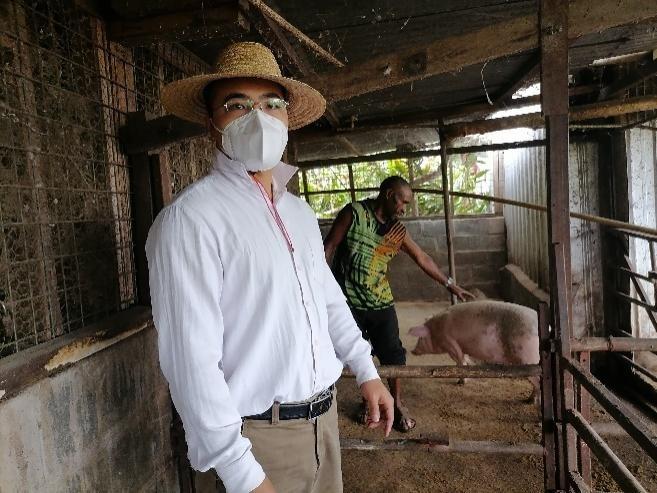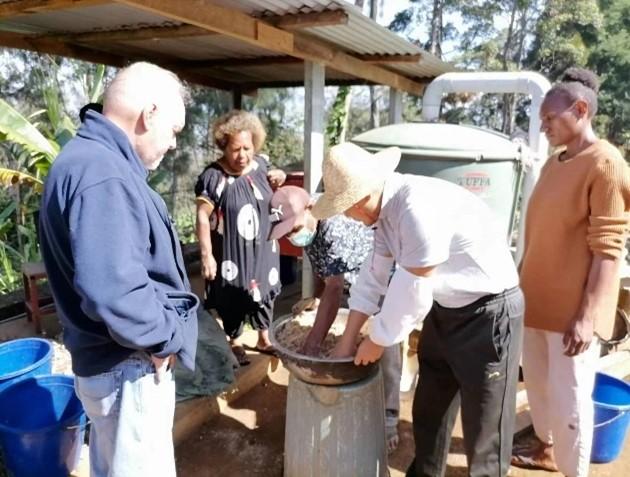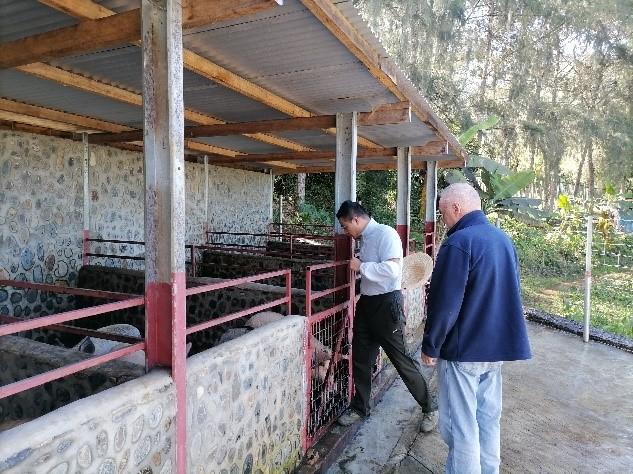Juncao is a unique and robust hybrid grass developed in China with the ability to withstand drought that can contribute to sustainable agricultural development through a number of agricultural and environmental management applications. A transliteration of a Chinese word composed of a character that means "fungi" and one that means "grass," Juncao got its name due to the fact that it can be used as a substrate for edible and medicinal fungi. The versatile plant's leaves and stems can also be used to feed herbivorous animals such as grass carp, geese, rabbits, pigs, sheep, and cattle and can significantly increase their growth rates among many other usage scenarios.
China has built Juncao demonstration bases in other countries since 2001 with the goal of introducing and popularising the important agricultural resource and helping people utilise it. The first was established in Papua New Guinea's Eastern Highlands Province, and Chinese experts have been tirelessly providing technical training pertaining to the cultivation and application of the grass and exhibiting and explaining ways it can be used to engage in and enhance endeavours such as livestock farming and fungi cultivation in order to help reduce poverty and increase incomes in the island country ever since. The Eastern Highlands government ultimately designated Juncao an important "agricultural innovation" and has been promoting the industry with the goal of it eventually becoming the second largest in the province after coffee farming.
Zaka Aburi, a housewife living in a suburb of Goroka City, Goroka District – the capital of Eastern Highlands – started cultivating edible fungi on Juncao substrate in February 2020 under the guidance of Chinese experts stationed in the country. Her annual income soon rose to 15,000 kina, which is approximately seven times what most of the families growing vegetables and coffee beans in the area earn.
"Cultivating mushrooms with Juncao substrate has given my family a delicious source of high-quality protein and increased our income, which was unimaginable in the past," she mentioned excitedly in the fall of 2022.

Chinese Juncao expert Xiao Zhengrun (left) poses for a photo at a pig farm located in Goroka District's 7 Mile community. This farm is owned by a resident named Ellen who also runs a feed mill in suburban Goroka City. Xiao just showed an employee named Abu (right) how to use the grass to make pig feed.
Ellen, a 56-year-old with three daughters in secondary school and a son in university, also lives in a suburb of Goroka City. He moved from Southern Highlands Province to Eastern Highlands Province in 2011 and began working as a traveling feed salesperson at a feed company known as Farmset in Goroka proper but was forced to discontinue the role and began committing himself to technical aspects of the industry in 2019 due to the immature and changing nature of the province’s animal husbandry industry. Ellen built a simple feed mill on his yard and a small pig farm in 7 Mile, which is a community in Goroka District located 11.27 km northwest of Goroka City on the way to Asaro. His lack of animal husbandry training proved to be a detriment, however; feed production was unstable, and productivity at the farm was poor.
A team of Chinese animal husbandry and Juncao experts eventually travelled to Ellen's feed workshop in April 2021 and conducted a full assessment of his operation. The team identified a number of technical issues, provided suggestions and assistance, and helped the farmer and business owner develop a detailed plan that he could implement in order to improve his feed formula, including by augmenting it with the hybrid grass and other additives, which made it possible for him to overcome the problems that had been plaguing his pig farm for the previous two years.
Improper feeding methods and outdated production management philosophy greatly hindered productivity at Ellen's pig farm before he started using the miracle grass as well. He visited the Juncao Demonstration Centre's piggery and learned Juncao production techniques and pig feeding management concepts at special training courses, however, which led to profit and productivity increasing. Ellen decided to begin growing his own Juncao at this time and end his dependence on suppliers, which further improved efficiency and reduced costs at his feed mill.
Chinese experts helped him develop a breeding plan for his pig farm based on his specific situation, which improved his pigs weaned per sow per year (PSY) value as well as his market pigs per sow per year (MSY) value, which refers to the number of pigs that a sow gives birth to that survive until they reach commercial weight in a year, in addition to reducing feeding costs.
The three breeding sows that Ellen's pig farm possessed in 2022 all successfully got pregnant from spring to fall of that year and gave birth to nine piglets per litter, which is higher than the Papua New Guinea average. His farm was expected to sell 47 market pigs in the first half of 2023, which would result in an estimated 120,000 kina of revenue, or approximately 2,500 kina per head.
Ellen plans to use some of his increasing profits to buy more land and grow crops that can be used to make feed, such as Juncao, soybeans, wheat, and corn, in order to meet demands associated with the increasing pig inventory in the area and promote Juncao-based feed, which will enable him to be able to continue to expand.


An elderly married couple, Mirriam and her husband live in an elevated part of Asaro, which is the capital of a district in northwest Eastern Highlands known as Daulo. They began raising pigs five years ago but did not have anyone to help them because their daughter was attending high school and their two sons were busy working elsewhere. Feed is sold at the foot of the mountainous area where they live but is relatively costly and difficult for them to retrieve. The couple's piggery had long suffered from low output and their animals' health was less than optimal because they were unable to purchase sufficient quality feed and a general lack of efficiency prevailed. Mirriam was aware of Juncao but did not know much about the specifics of using the plant and growing it. A Chinese Juncao expert group eventually held training courses in Asaro in 2022 that included material on how the grass can be applied to animal husbandry. The couple was excited when they heard the news and eager to participate.
The Chinese experts conducted a field survey of the couple's farm and discovered a relatively small piggery with an inventory of 20 head, including 4 sows and 1 boar. They also noticed that various factors resulted in a cramped and illogical layout, which negatively affected the animals' development and restrained the operation. The experts, therefore, helped them reconfigure and revamp their facilities in a manner that made the best use of existing conditions. They also taught them how to grow Juncao and make feed out of a mixture of the grass, wheat and rice bran, and other ingredients, which eliminated the need for them to buy feed and transport it and reduced costs by a total of 400 kina for every pig that grows to 100 kg.
The Chinese expert team has donated a total of 200 kg of Juncao feed to Mirriam as of July 21, 2022, and she arranged for one of her sons to retrieve some of it from the Juncao Demonstration Base every 10 days. The feed has greatly improved the widely used body condition scores (BCS) of her pigs, which reflect health, welfare, productivity, and longevity, shortened the time it takes for them to achieve slaughter weight, and reduced inventory pressure. The farmer also started growing her own Juncao in front of her home with the goal of eventually producing all of her own feed and was doing so across 1 mu of land as of July 2022.

For more information, please contact WFP China COE (wfpcn.coe@wfp.org)
Related Links:
Juncao Grass and Upland Rice Promote Food Security and Sustainable Development in Papua New Guinea
Letters from China: Juncao Technology New Path to Sustainable Development
Planting the Seeds of Prosperity
Fujian Helps PNG Innovate with Grass
Juncao Technology -- Breeding Fungi with Herbaceous Plants: From China and For the World
Category
Magical Juncao Grass Boosts Profits, Creates New Opportunities for Farmers in Papua New Guinea
Contributor
Magical Juncao Grass Boosts Profits, Creates New Opportunities for Farmers in Papua New Guinea
Country
Story

